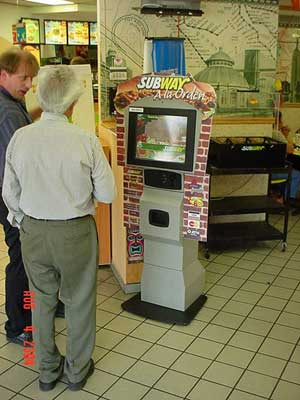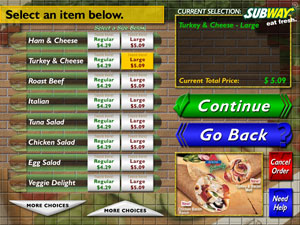Article
Making fast food even faster
Kiosks are beginning to pop up in quick-service restaurants, helping speed the ordering process and improve the customer experience ... and among their champions is the man who almost single-handedly invented the videogame industry.
June 29, 2005 by James Bickers — Editor, Networld Alliance
Real entrepreneurs never stop looking for the next great innovation. Even when they retire a high-profile project, their minds are forever voyaging, seeking out new opportunities and pondering new breakthroughs.
Nolan Bushnell had a true breakthrough in 1972 when he started the company Atari, chiefly on the strength of the videogame Pong. Three years later, Pong would be introduced as a home entertainment device, and the videogame industry was born.
Bushnell sold Atari in 1976 and began a string of successful business ventures, including the pizza chain Chuck E. Cheese's Pizza Time Theater. Today, he is the chief executive officer for uWink, a Los Angeles-based entertainment company that recently announced its uWink Ordering System, a touchscreen order entry system designed for restaurants.
"This is the first step to providing restaurant-goers with an easy-to-use ordering system," Bushnell said in a press release. "And by providing restaurant owners with real-time business information, such as revenue and order status, they are better enabled to run a profitable business."
-- Nolan Bushnell, CEO of uWink, former founder of Atari |
With the uWink system, customers place orders through a touchscreen, swipe a debit or credit card to pay for the transaction, and specify delivery options - for instance, whether to pick the food up at the counter or have it brought to the table. The system also allows restaurant operators to run loyalty programs using "club cards," which can store diner preferences such as menu favorites and preferred drinks.
Tackling QSR problems
The venerable quick-service restaurant industry is a part of American life, somewhere near apple pie and baseball on the cultural radar. It is an established, profitable business model - and one with its own set of challenges and frustrations for owners and operators.
When asked to name their biggest headaches, most QSR owners will surely list labor near the top. Good help is truly hard to find, harder still to keep, and QSRs constantly deal with high turnover rates behind the counter.
 |
Customers use the new self-order kiosk designed for Subway restaurants by Pro-Tech. |
"When (owners) do hire people to work the store, they actually have to overstaff by almost 50 percent to ensure that they will have a sufficient number of employees to show up for work in the morning," said Peter Kaszycki, president of Suwanee, Geo.-based Pro-Tech. "If they could find a solution to this issue, or at least minimize the impact, they would be happy."
Theft is another constant problem. What can be done about the teenager at the checkout who gives his buddies a free upgrade, if not a free meal?
"QSR operators in general are looking to reduce their losses, and we see that not just in terms of kiosks but also in the countertop space," said Floyd Jones, kiosk market manager for Telequip, a Salem, N.H.-based company that specializes in free-standing and embedded coin dispensers. He pointed to one of the QSR's longest-running headaches as an example: cashiers ringing up a small soda, for instance, charging for a large and pocketing the difference.
Then, of course, you have the issue of long lines; after all, the operative word in "fast food" is "fast," but that's hard to accomplish when lines back up and tempers start to flare.
"A long line means that customers have to wait and become upset or they simply leave," Kaszycki said. "Also, when the line is long, the order-taker does not take the time to upsell. Many owners make a significant margin on the upsell - that's why they push it so much with advertising and promotions. However, when they have the most customers in the store they have the least amount of time to do the upsell."
A mechanical solution
Kiosks appear to be an ideal solution to all three problems.
 |
The interface for the Subway/Pro-Tech order kiosk. |
"We feel that the QSR model is ripe for a self-ordering kiosk solution," said Kaszycki. "It is an employee that never calls in sick, never has a 'bad-hair' day, and always - and I mean always - offers the up-sell through both software and voice-over prompts." He added that tests with his company's kiosks have shown upsells of 15 to 20 percent, "which is huge, since these are high-margin items."
"The response has been very positive," said a spokesperson for the Subway restaurant chain, which is beginning to implement kiosks from Pro-Tech in its stores. "The customers used it once and then used it again when they came back in with no assistance. One customer in particular used the kiosk the first day and then went back to his office and told everyone about this new ordering option. The next day, he was back with a bunch of his co-workers and he was actually showing them how to use the kiosk, proud that he discovered this new technology."
According to Subway, exit surveys revealed an overwhelmingly positive consumer reaction, and most customers that used the self-ordering kiosks wondered why other QSRs haven't started offering them.
Customers will indeed be taken by the newness of the experience, but QSR owners are going to want more than just that to justify the machines - they will want to know that they are making a positive difference to the business.
"The QSR owner is always looking to reduce costs, not spend more money on a fancy kiosk," Kaszycki said. "They need to be educated that the kiosk can actually increase their bottom line, increase customer satisfaction and reduce their labor issues." He said that on Pro-Tech models, the kiosk pays for itself within four to six months.
|
Making them work
As with any kiosk application, success requires more than buying and installing machinery. In a high-traffic business like QSR, the machine has to be integrated into the fast-food dining experience - an experience that most people are already intimately acquainted with. If a new device changes that experience in ways that are in any way perceived as negative, that device will quickly be abandoned.
According to Jones, one key to success is making sure that the kiosk can handle all transactions, not just some of them.
"There have been some pilots that haven't been a roaring success, and mostly because they haven't been able to offload all of the transactions from the cashier onto the kiosk," he said. "In the one case I can think about, they didn't handle coins at the kiosk, so the kiosk wasn't able to handle all transactions. I think a good kiosk with a strong ROI needs to be able to handle all transactions, including those that give change."
Kaszycki added that operators need to take time to get everybody in the store - staff and customers - comfortable with the kiosk.
"During the first few weeks, they should offer something free if (the customers) use the kiosk, like a free cookie or free upgrade on the soda," he said. "In addition, the owner must assign at least one person as a greeter to help customers, for the first few weeks, with placing orders and answering any questions."
Then, of course, there is the personnel issue. What is a boon for the operator can easily be perceived as a negative to staff. Operators need to be delicate when introducing a device that, in the minds of some, exists to take away a human job.
"It's always a sensitive subject," Jones said. "Whether it's QSR operators or hotels looking at self check-in or airlines, nobody's ever going to say `I want to reduce staff.' You hear people like Home Depot talk about self checkout. What they say is, instead of getting rid of that staff, they want to redeploy that staff to give better service in the aisle." In the case of QSR, a move to kiosk ordering might mean that cashiers have the opportunity to move either into the kitchen or out into the front of the store, providing customer service.
The next big thing?
Jones said that while the use of kiosks in QSRs has definite benefits for the customer, he sees it chiefly as a boon to the restaurant operator. He sees the automation aspect of it as a big draw - again, with the stipulation that the device needs to be able to handle every transaction, not just some of them.
"We do see a lot of interest from the QSR operators and the kiosk manufacturers," Jones said. "I've been in the kiosk business for a while, and there have been a lot of ideas over the years that come and go, and I'm not sure why this idea didn't come up a long time ago. But lately, there's been a lot of interest in it. There's a feeling that there should be a strong ROI there, following along the lines of checking yourself in at the airport."
According to Jones, once somebody does get all of the kinks worked out, the QSR kiosk could be the industry's next killer app.
"I think probably what will happen, someone will get it right - they'll have a well-written app and have the kiosk in the right place, and it will be a better experience for the consumer - and roll it out in a large channel, and others will have to follow suit," he said.
Kaszycki agrees. "Once one of them does it, the others will be forced to follow suit, just like the airlines have all followed Delta with self-check-in kiosks," he said. "The next step is to put the kiosk out at the drive-up window."











